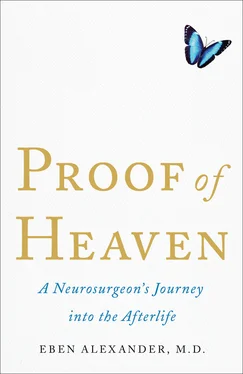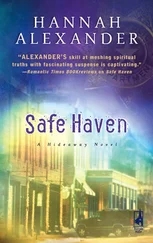“What’s going on?”
“Your father doesn’t feel well, honey,” Holley said.
I was still lying on the bed with my head propped up on a pillow. Bond came over, reached out, and began to massage my temples gently.
His touch sent what felt like a lightning bolt through my head—the worst pain yet. I screamed. Surprised by my reaction, Bond jumped back.
“It’s okay,” Holley said to Bond, clearly thinking otherwise. “It’s nothing you did. Dad has a horrible headache.” Then I heard her say, more to herself than to me: “I wonder if I should call an ambulance.”
If there’s one thing doctors hate even more than being sick, it’s being in the emergency room as a patient. I pictured the house filling up with EMTs, the retinue of stock questions, the ride to the hospital, the paperwork… I thought at some point I would begin to feel better and regret calling an ambulance in the first place.
“No, it’s okay,” I said. “It’s bad now but it’s bound to get better soon. You should probably help Bond get ready for school.”
“Eben, I really think—”
“I’ll be fine,” I interrupted, my face still buried in the pillow. I was still paralyzed by the pain. “Seriously, do not call nine-one-one. I’m not that sick. It’s just a muscle spasm in my lower back, and a headache.”
Reluctantly, Holley took Bond downstairs and fed him some breakfast before sending him up the street to a friend’s house to catch a ride to school. As Bond was going out the front door, the thought occurred to me that if this was something serious and I did end up in the hospital, I might not see him after school that afternoon. I mustered all my energy and croaked out, “Have a good day at school, Bond.”
By the time Holley came back upstairs to check on me, I was slipping into unconsciousness. Thinking I was napping, she left me to rest and went downstairs to call some of my colleagues, hoping to get their opinions on what might be happening.
Two hours later, feeling she’d let me rest long enough, she came back to check on me. Pushing open our bedroom door, she saw me lying in bed just as before. But looking closer, she saw that my body wasn’t relaxed as it had been, but rigid as a board. She turned on the light and saw that I was jerking violently. My lower jaw was jutting forward unnaturally, and my eyes were open and rolling back in my head.
“Eben, say something!” Holley screamed. When I didn’t respond, she called nine-one-one. It took the EMTs less than ten minutes to arrive, and they quickly loaded me into an ambulance bound for the Lynchburg General Hospital emergency room.
Had I been conscious, I could have told Holley exactly what I was undergoing there on the bed during those terrifying moments she spent waiting for the ambulance: a full grand mal seizure, brought on, no doubt, by some kind of extremely severe shock to my brain.
But of course, I was not able to do that.
For the next seven days, I would be present to Holley and the rest of my family in body alone. I remember nothing of this world during that week and have had to glean from others those parts of this story that occurred during the time I was unconscious. My mind, my spirit—whatever you may choose to call the central, human part of me—was gone.
The Lynchburg General Hospital emergency room is the second-busiest ER in the state of Virginia and is typically in full swing by 9:30 on a weekday morning. That Monday was no exception. Though I spent most of my workdays in Charlottesville, I’d logged plenty of operating time at Lynchburg General, and I knew just about everyone there.
Laura Potter, an ER physician I’d known and worked with closely for almost two years, received the call from the ambulance that a fifty-four-year-old Caucasian male, in status epilepticus, was about to arrive in her ER. As she headed down to the ambulance entrance, she ran over the list of possible causes for the incoming patient’s condition. It was the same list that I’d have come up with if I had been in her shoes: alcohol withdrawal; drug overdose; hyponatremia (abnormally low sodium level in the blood); stroke; metastatic or primary brain tumor; intraparenchymal hemorrhage (bleeding into the substance of the brain); brain abscess… and meningitis.
When the EMTs wheeled me into Major Bay 1 of the ER, I was still convulsing violently, while intermittently groaning and flailing my arms and legs.
It was obvious to Dr. Potter from the way I was raving and writhing around that my brain was under heavy attack. A nurse brought over a crash cart, another drew blood, and a third replaced the first, now empty, intravenous bag that the EMTs had set up at our house before loading me into the ambulance. As they went to work on me, I was squirming like a six-foot fish pulled out of the water. I spouted bursts of garbled, nonsensical sounds and animal-like cries. Just as troubling to Laura as the seizures was that I seemed to show an asymmetry in the motor control of my body. That could mean that not only was my brain under attack but that serious and possibly irreversible brain damage was already under way.
The sight of any patient in such a state takes getting used to, but Laura had seen it all in her many years in the ER. She had never seen one of her fellow physicians delivered into the ER in this condition, however, and looking closer at the contorted, shouting patient on the gurney, she said, almost to herself, “Eben.”
Then, more loudly, alerting the other doctors and nurses in the area: “This is Eben Alexander.”
Nearby staff who heard her gathered around my stretcher. Holley, who’d been following the ambulance, joined the crowd while Laura reeled off the obligatory questions about the most obvious possible causes for someone in my condition. Was I withdrawing from alcohol? Had I recently ingested any strong hallucinogenic street drugs? Then she went to work trying to bring my seizures to a halt.
In recent months, Eben IV had been putting me through a vigorous conditioning program for a planned father-son climb up Ecuador’s 19,300-foot Mount Cotopaxi, which he had climbed the previous February. The program had increased my strength considerably, making it that much more difficult for the orderlies trying to hold me down. Five minutes and 15 milligrams of intravenous diazepam later, I was still delirious and still trying to fight everyone off, but to Dr. Potter’s relief I was at least now fighting with both sides of my body. Holley told Laura about the severe headache I’d been having before I went into seizure, which prompted Dr. Potter to perform a lumbar puncture—a procedure in which a small amount of cerebrospinal fluid is extracted from the base of the spine.
Cerebrospinal fluid is a clear, watery substance that runs along the surface of the spinal cord and coats the brain, cushioning it from impacts. A normal, healthy human body produces about a pint of it a day, and any diminishment in the clarity of the fluid indicates that an infection or hemorrhage has occurred.
Such an infection is called meningitis: the swelling of the meninges, the membranes that line the inside of the spine and skull and that are in direct contact with the cerebrospinal fluid. In four cases out of five a virus causes the disease. Viral meningitis can make a patient quite ill, but it is only fatal in approximately 1 percent of cases. In one case out of five, however, bacteria cause meningitis. Bacteria, being more primitive than viruses, can be a more dangerous foe. Cases of bacterial meningitis are uniformly fatal if untreated. Even when treated rapidly with the appropriate antibiotics, the mortality rate ranges from 15 to 40 percent.
One of the least likely culprits for bacterial meningitis in adults is a very old and very tough bacteria named Escherichia coli —better known simply as E. coli . No one knows how old E. coli is precisely, but estimates hover between three and four billion years. The organism has no nucleus and reproduces by the primitive but extremely efficient process known as asexual binary fission (in other words, by splitting in two). Imagine a cell filled, essentially, with DNA, that can take in nutrients (usually from other cells that it attacks and absorbs) directly through its cellular wall. Then imagine that it can simultaneously copy several strands of DNA and split into two daughter cells every twenty minutes or so. In an hour, you’ll have 8 of them. In twelve hours, 69 billion. By hour fifteen, you’ll have 35 trillion. This explosive growth only slows when its food begins to run out.
Читать дальше












